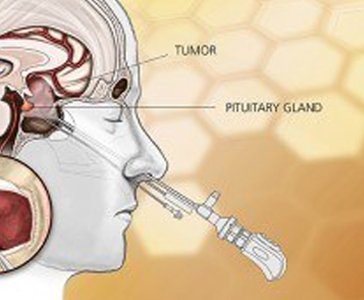Pituitary Tumor Specialist Doctor in Delhi NCR
Treatment of Pituitary Tumor in Delhi ?
Pituitary tumors are abnormal growths that form in the pituitary gland, a small gland located at the base of the brain. The pituitary gland is responsible for producing and regulating hormones that control various functions in the body, such as growth, metabolism, and reproduction. Pituitary tumors are relatively common and can cause a range of symptoms depending on their size and location.
Types of Pituitary Tumors :-
Pituitary tumors are classified based on their size, location, and whether they produce hormones. The two main types of pituitary tumors are:
1. Functioning tumors: These tumors produce hormones that can cause hormonal imbalances and various symptoms, depending on the type of hormone produced. For example, prolactinoma is a type of pituitary tumor that produces prolactin, a hormone that stimulates milk production. Prolactinomas can cause irregular periods, decreased libido, and milk production (even in non-pregnant women and men).
2. Non-functioning tumors: These tumors do not produce hormones, but they can still cause symptoms by pressing on the surrounding structures in the brain. Non-functioning tumors are often detected when they become large enough to cause symptoms such as headaches, vision problems, and hormonal imbalances.
If you’re in need of a pituitary tumors specialist, look no further than Dr. Hrishikesh Chakrabartty. With extensive experience in the treatment of pituitary tumors, Dr. Chakrabartty and our team can provide the expert care and support you need. We offer a range of treatment options and personalized care plans to help you on your road to recovery. Contact us today to learn more and schedule a consultation with our doctor of pituitary tumors.
Causes of Pituitary Tumors
The exact cause of pituitary tumors is not known. However, researchers have identified some risk factors that may increase the likelihood of developing a pituitary tumor. These include:
A family history of pituitary tumors
Certain genetic disorders, such as multiple endocrine neoplasia type 1 (MEN1) and Carney complex Exposure to radiation Rarely, a head injury Symptoms of Pituitary Tumors The symptoms of pituitary tumors depend on the size, location, and hormone production of the tumor. Some common symptoms include:
Headaches
Vision problems, such as double vision or loss of peripheral vision Hormonal imbalances, such as irregular periods, decreased libido, and milk production Fatigue Growth abnormalities, such as gigantism (excessive growth hormone production in children) or acromegaly (excessive growth hormone production in adults) Cognitive and memory problems
Diagnosis of Pituitary Tumors
A doctor may suspect a pituitary tumor based on the patient’s symptoms and medical history. The diagnosis of a pituitary tumor often involves a combination of physical exams, blood tests, and imaging tests, such as a CT scan or an MRI. Blood tests can also help to determine if the tumor is producing hormones.
Treatment of Pituitary Tumors
The treatment of a pituitary tumor depends on the size and type of tumor, as well as the symptoms it is causing. Treatment options may include:
Medications to reduce the production of hormones or to shrink the tumor Surgery to remove the tumor (transsphenoidal surgery is the most common procedure) Radiation therapy to shrink the tumor and prevent it from growing further In some cases, a combination of treatments may be necessary.
Conclusion
Pituitary tumors are abnormal growths that form in the pituitary gland, a small gland located at the base of the brain. They can cause a range of symptoms, such as headaches, vision problems, hormonal imbalances, and fatigue. Treatment options for pituitary tumors depend on the size and type of tumor, as well as the symptoms it is causing. If you suspect you may have a pituitary tumor, it is important to speak with a doctor who can provide a diagnosis and recommend the appropriate treatment.


